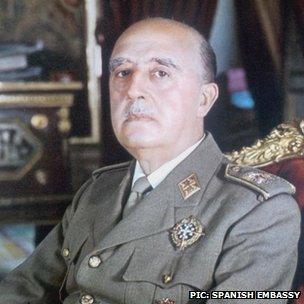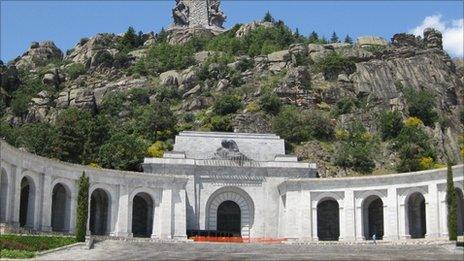UN presses Spain over Franco-era crimes and mass graves
- Published
Relatives of Franco-era victims demanded justice in Madrid last week
United Nations experts have urged Spain to investigate what happened to thousands of people who went missing during the civil war and nationalist Franco dictatorship.
The plea came, external after a week-long visit to Spain by a UN working group, who met government officials and victims' relatives in several regions.
Franco-era crimes were pardoned under a 1977 amnesty law, passed two years after Gen Francisco Franco died.
Many mass graves were just abandoned.
"The state must assume a leadership role and engage more actively to respond to the demands of thousands of families searching for the fate or whereabouts of their loved ones who disappeared during the civil war and the dictatorship," said the UN Working Group on Enforced or Involuntary Disappearances.
A report on their findings will be presented to the Geneva-based UN Human Rights Council next year.
"There is no ongoing effective criminal investigation nor any person convicted," the experts said.
They regretted that Spain's amnesty law remains in force, and also complained of difficulties in accessing archives.
"Given the passing of time and the old age of many of the witnesses and relatives, it is urgent that the state respond to their claims as an immediate priority," they said.
Argentina probe

Gen Franco ruled Spain with an iron fist for almost 40 years
A network of victims' relatives, the Association for the Recovery of Historical Memory (ARMH in Spanish), has a list of 41 mass graves, but says the remains have not been exhumed "because of a lack of funds".
In 2008 a Spanish judge, Baltasar Garzon, decided to investigate the disappearance of tens of thousands of people during the Franco era. He ordered the excavation of mass graves - but the move was highly controversial.
In 2010 he was forced to drop the investigation and was suspended after Spain's supreme court found that he had ignored the 1977 amnesty law. That law was passed in order to ease Spain's transition to democracy after Franco's rule.
Currently an Argentinian judge is investigating Franco-era crimes under the international legal principle of universal justice.
Judge Garzon had invoked the same principle to investigate crimes against humanity committed under Argentina's 1976-83 military dictatorship, as well as to seek the extradition of the late Chilean military ruler, Augusto Pinochet.
The UN experts urged the Spanish government to revive the universal justice principle for Franco-era crimes and help the Argentinian judge.
- Published21 August 2023

- Published18 December 2012
- Published19 July 2011

- Published4 September 2010